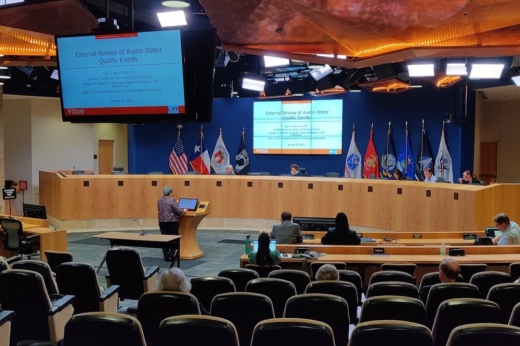The audit, called for in the aftermath of last February's citywide boil-water notice and conducted by water specialists with The University of Texas, was released earlier this month. The report laid out dozens of recommendations for the city water utility and was reviewed by City Council's audit committee Jan. 18.
Austin Water leaders plan to return before city officials soon with more information on their next steps for systemwide updates as work continues.
“We are a learning organization, and we are already working on many of these recommendations. We want to reinforce areas where we’re strong, and we want to strengthen areas that need it," AW Director Shay Ralls Roalson said.
In their review of the utility, UT auditors found Austin Water is generally maintaining its 100-year history of producing quality drinking water for Austin residents the majority of the time. They also said AW has made strides on recommendations produced after previous water quality events aimed at improving its infrastructure and credited staff for dedication to the utility's key role in the city.
Lynn Katz, director of UT's Center for Water and the Environment, said a chief focus for the utility should be its staffing and management structure—areas in which the new audit report detailed several potential flaws. Katz also said the utility should not be faulted for aspects of boil-water notices and other events from 2018-21 that were largely outside AW control, but that last year's boil notice caused by operator error was an example of how internal shortfalls can affect one of the city's critical resources.
“This was a serious and avoidable failure that exposed some of the management organizational issues, including staffing, training, internal communications, emergency response and management," Katz said. "This is one of the areas we spent a lot of our recommendations [in] because we felt like this is where attention needed to be."
Roalson and Katz also noted that understaffing is a persistent issue in the water industry nationwide.
Staffing assessment
Hiring and retention practices will continue to be a priority for Roalson and city leaders overseeing the utility. Nearly one-third of Austin Water's staff positions are now sitting vacant, and auditors said employee training, compensation and overall staffing should be a priority.
Internally, Katz said auditors found a "serious disconnect" between efforts made by senior AW leaders to improve operations at water treatment plants and "minimal" engagement by some staffers. The audit also stated that Ullrich Water Treatment Plant—the city's main water facility located in West Austin, and the site of last February's breakdown—should be managed by a single individual to improve operations there.
“We believe that effective operation of a treatment plant as complex as Ullrich requires a full complement of operators, a better-trained staff, and coordination among the staff, supervisors and management at Ullrich and across Austin Water," Katz said.
Utility representatives are set to bring more concrete information on AW's staffing plans to City Council in the weeks ahead. For now, Roalson said work to address the staffing questions is underway with a focus on attracting new hires and considering fair compensation options for both new and longtime employees.
District 10 Council Member Alison Alter, a critic of city management's response to citywide staffing shortfalls, also said the situation at AW closely mirrors what many other city departments are experiencing and should be considered as work is done in other fields as well.
"I would really invite our senior management to take a look at this report and not look at it solely through the lens of Austin Water. We have many departments that need to be high-reliability organizations, that need to be functioning better, that are experiencing the same problems," she said.
Alter and council committee members Vanessa Fuentes, Ryan Alter, Mackenzie Kelly and Leslie Pool left Austin Water with several questions regarding staffing, system reliability, water treatment and more. AW will provide a rundown of progress made in those areas in February.
The audit team forwarded more than 50 recommendations for the utility to consider. Most were accepted immediately, and Roalson said more information on the status of those items can also be expected next month.





